The Krishi Vigyan Kendras (KVKs) conducted 1.32 lakh assessment trials of technologies at farmers’ fields and 8.69 lakh demonstrations on different technologies related to crops, livestock, fisheries, farm machineries and other enterprises during the last three years, the Lok Sabha was informed on Tuesday.
“The technologies developed out of research conducted by ICAR are taken to farmers’ fields for its assessment by KVKs to ascertain their location specificity under various farming systems. KVKs also conduct a large number of technology demonstrations at farmers’ fields for their adoption by the farmers,” Minister of State for Agriculture and Farmers’ Welfare, Bhagirath Choudhary said in a written reply in the Lok Sabha.
Advertisement
The Government makes continuous efforts to upgrade the infrastructure of KVKs across the country for better services to the farmers. During last year, the Government made Rs 7730.76 lakh budget provision for upgrading the infrastructure. Infrastructure includes Administrative Building, Farmers Hostel, Demonstration Unit, Farm Development Works.
The Government has created a strong monitoring and review mechanism for KVKs to make it a vibrant and effective institution of technology transfer at district level.
Monitoring and review of KVKs is done regularly at National, Zonal, University and District level by Indian Council of Agricultural Research, Agricultural Technology Application Research Institutes, Agricultural Universities and Scientific Advisory Committee of each KVK, respectively.
The performance and working of KVKs is also reviewed by the Government periodically through Quinquennial Review Teams and Third Party. Last such evaluations were conducted by International Food Policy Research Institute and Indian Society of Agribusiness Professionals, New Delhi in the year 2019 and 2020, respectively.
The major findings of these evaluations include KVKs’ efforts generating an additional net farm income of Rs 5752 per hectare, very high rate of return on expenditure on KVK (1: 11.78 Cost Benefit ratio), one KVK trained farmer trained disseminating technology/knowledge to 30 fellow farmers, increase in outreach, increase in proportion of farm women in training and increase in seed production and planting material.
The number of KVKs under State Government, ICAR, NGO and Agricultural Universities are 38, 66, 101 and 509, respectively.










